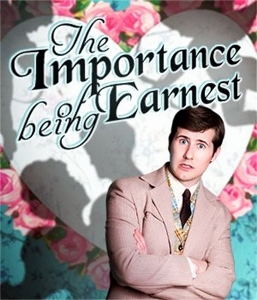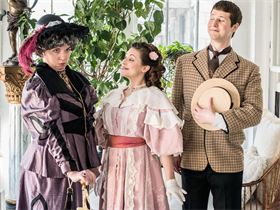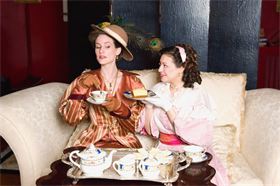THE LIES THAT PASS FOR LOVE
Many years ago, a half hour into the Body Politic Theatre’s revival of The Importance of Being Earnest a woman behind me very softly threw up. It was done so efficiently, even decorously, that it barely disturbed the patrons near her, let alone the performance. In a strange way her unavoidable act seemed a compliment to the play: something very natural had been restrained till it was all but harmless.
That’s what happens in Oscar Wilde’s master comedy of 1895, “a trivial play for serious people.” Along with the characters’ delicate lust for status and property, Earnest depicts a marriage mating game. But Wilde shrewdly overlays these seamy urges with his own elaborate artifices; the result is an artistic repression that artfully parallels the social sort he spoofs.
A play that declares, “We live in an age of surfaces” proves it with its machinery. The characters seem so conventional that each ”non sequitur” they pronounce with addlepated conviction carries an unexpected undertow. Wilde may say that “the very essence of romance is uncertainty” but the maxim applies much more to his comedy; here, for instance, without sensing the slightest contradiction Cecily can describe her diary as “a very young girl’s record of her own thoughts and impressions, and consequently meant for publication.”
What fascinates here is not the question of who gets who, when and how; it’s not even Wilde’s unstoppable flow of effortless wit. It’s the sight of Wilde’s cunning poseurs dexterously and unhesitatingly replacing one fashionable deception with the next serviceable lie. Earnest is packed with multilayered prevarications. (It was this calculated insincerity that made G.B. Shaw, the only critic to pan this instant hit, call Wilde’s nonsense “hateful” and “sinister” and say that it exhibited “real degeneracy.” Shaw didn’t know how right he was: “Earnest” was a secret word for “gay,” much like today’s “queer,” though with the opposite implication.)
Fictions abound. Wilde’s elegant dilettantes Algernon Moncrieff (“He has nothing but looks everything”) and John Worthing J.P., gilded butterflies with independent incomes, have concocted two all-purpose charades to conceal their secret love lives (something the homosexual Wilde did with his marriage). Algernon has invented a friend called Bunbury (a code word for gay sex in the 1890s) whose many convenient illnesses allow him to escape his dowager Aunt Augusta’s social predations. Equally evasive, prudish Jack has sequestered his lovely ward Cecily in his country estate (hoping to keep her pure by keeping her cloistered, much like Agnes in Moliere’s School for Wives). From there he regularly runs off to London under the pretext of having to take care of a sinful and imaginary brother Ernest. (Jack has reason to prefer fiction to fact: all he knows of his origin is that he was deposited in a lady’s handbag in Victoria Station the Brighton Line.)
Young Cecily’s imagination confounds her guardian’s fabrications: She’s in love with the unseen Ernest or, more properly, his noble name. (How typical that a Wilde character should confuse a name with a quality!) Without ever meeting him, Cecily has dutifully recorded their tempestuous courtship in her busy diary. The other lady in question is Algernon’s cousin Gwendolen Fairfax, Jack’s fatuous but iron-willed fiancee; she too loves the name of Ernest, which, swallowing another of Jack’s lies, she believes to be his own.
Besides the difficulty that neither suitor is named Ernest, there’s formidable Aunt Augusta, Gwendolen’s mother, (Lady Bracknell) a harridan dragon lady who refuses to allow her daughter to “form an alliance with a parcel,” i.e., Jack. Because she knows that her feckless nephew Algernon’s one hope for success in life lies in a modern marriage, i.e, a merger with money, Aunt Augusta gives Cecily a grilling that would be cruel if it weren’t hilarious: The poor girl must prove her dowry as comfortable and her soul as shallow as London society could desire. Wilde concludes his hothouse hilarity by unleashing revelations every bit as contrived as the inconsequential conflicts they resolve.
Much of his satire plays as if Wilde had anticipated his imminent fall from grace (when he let himself be exposed as a seducer of stable boys); before being sentenced to two years of hard labor, he in effect subverted the high society that would turn on him.
The first installment in Dead Writers Collective’s “Mad About the Boy” season, this appropriately stylized (even cartoony) staging is itself earnest and engaging and can often pass for inspired. Director Jim Schneider, making next to no cuts in the almost three-hour romp, rightly preserves the crisp pace that verbal farce delights in. More suitable for a Christmas “panto” with its music-hall proscenium, Eric Luchen’s set appropriately evokes pop-up Victorian valentines. Much more realistic, Patti Roeder’s sumptuous, period-perfect garb delivers stunning fashionplates sprung to perfect life. Though at times resorting to the occasional bellow, Schneider’s surefire direction remains faithful to W.S. Gilbert’s instructions for his Engaged: “It is absolutely essential to the success of this piece that it should be played with the most perfect earnestness and gravity throughout…Directly [Once] the actors show that they are conscious of the absurdity of their utterances, the piece begins to drag.”
The sterling performances are what you get from a well-honed ensemble who can punch home this barbed tomfoolery. Any unevenness of talent would rule out the smooth stylization Wilde requires. Happily, they are equally absurd. No one betrays the play with a moment of pomposity-puncturing realism.
Mary Anne Bowman’s sourpuss impersonation of Lady Bracknell, an imperious character modeled on Queen Victoria, relies on no camp overkill to convey the dreaded dowager’s full fury. Pursing her mouth like Maggie Smith on alum, stiffly strutting like a galleon in full sail, all but proving that Aunt Augusta was weaned on a pickle, Bowman chews, bites and spits out each idiotic remark with a merciless deadpan.
Charming with her chirpy Baby Boop girl’s voice and merry mince is Megan Delay, pertly puncturing fatuities as the minx Cecily. No question, this capricious airhead is a credible and comparatively complex creation. Exquisite in her artificiality, Maeghan Looney’s pert and sweetly smug Gwendolen proves deadly at snapping a throwaway zinger to the last row. In her devastating tea-party squabble with Cecily, she drops the demurely dull facade and bares some pearly teeth.
As Cecily’s duplicitous wooer, Jack Dryden sports the correct flippant delivery and looks the upper class twit but he’s no man of leisure when it comes to getting a laugh every line. This Algie also has a cutting edge amid his childish petulance. Betraying the fluster of a manic duffer who must even be embarrassed in his sleep, Sean Magill, as the prudish 29-year-old rake Jack, is a font of comic timing, believable bluster, an outsized slow burn, and quick reactions.
Playing a ridiculously respectable governess who hides a penny-dreadful past, Patti Roeder simpers and sputters and fully inhabits Miss Prism’s flagrantly inappropriate romantic nature. Elliott Fredland’s Rev. Canon Chasuble, D.D., the rector who adores her, has the right High Church unctuousness. His catechism-like courtship of Miss Prism is a perfect portrait of Victorian repression in action.
Though without the ornately textured and detailed settings of last season’s perfectly pictorial Lady Windermere’s Fan at Stage 773, Dead Writers’ scrappy revival at the Athenaeum Theatre manages, crucially, to be utterly unimportant and far from earnest. Oscar would be proud.
photos by Emma Meyer
The Importance of Being Earnest
Dead Writers Theatre Collective
Athenaeum Theatre, 2936 N Southport Ave.
Thurs-Sat at 7:30; Sun at 2:30
ends on July 31, 2016
for tickets, visit Dead Writers
for more shows, visit Theatre in Chicago



{ 2 comments… read them below or add one }
FWIW: I was intrigued by those instructions of Wilde’s you quote regarding how best to perform his play, since I hadn’t come across them before. It turns out that it’s actually something W. S. Gilbert wrote regarding his play ENGAGED. It does seem that Gilbert’s note to his actors may have influenced Wilde.
For accuracy’s sake, as much as poetic justice, I appreciate the helpful correction. I got the quote from the program of an earlier production of Earnest–and am glad that you checked the source when I could not. Gilbert, of course, had mocked Wilde’s aestheticism in Patience, his Savoy opera with Arthur Sullivan: He spoofed the too-fashionable poet/fop “Archibald Grosvenor” who’d “walk down Picadilly / With a poppy or a lily / In his medieval hand.” But they both agreed, it seems, on how to handle humor. The review has been updated and now reflects the correct attribution of the quote. Thanks!